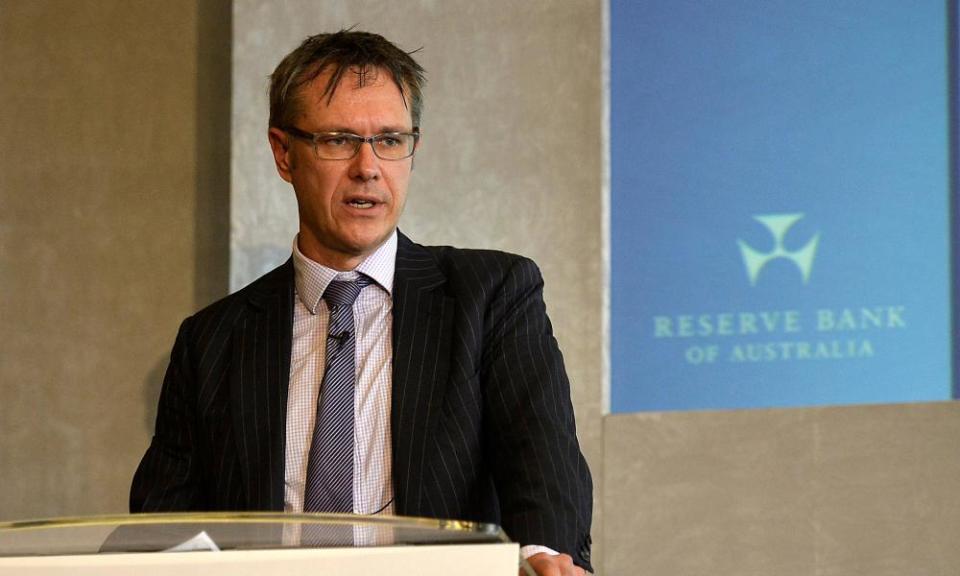Employers finding ways to avoid lifting wages, Reserve Bank says

Australia’s employers are finding inventive ways to avoid lifting wages for their staff as the economy improves, the Reserve Bank has found.
Guy Debelle, the RBA deputy governor, says Australia’s jobs market is in “pretty good shape”, with many indicators suggesting wages should be growing more quickly.
Employment growth is above-average, the participation rate is at a high level, the vacancy rate is at an all-time high, and the unemployment rate is still trending down.
But wages growth is still low, he says, with a slight pick-up in growth occurring only recently. Around one quarter of all employees received a 3.5% pay rise on 1 July following the increase in the national minimum and award wages, and some new enterprise bargaining agreements have been signed for retail and public sector employees following a lengthy period in which wages had been frozen.
Debelle says as Australia’s labour market has tightened, employers are finding ways to retain some of their employees without raising wages for everyone.
“Many businesses in our liaison program report that they are linking wages growth outcomes to individual performance, which provides employers the flexibility to reward and retain strong performers and valued skill sets while keeping average wages growth contained,” he said on Wednesday.
“The use of bonuses, especially to retain key staff, is also prevalent, which doesn’t permanently raise labour costs.
“[And] some firms are attempting to retain staff by using non-wage incentives, including flexible work arrangements, shares, subsidised gym memberships, development opportunities and additional annual leave.”
Debelle’s insight contributes to the message the RBA has been pushing for some time.
In February, the RBA governor, Philip Lowe, sent a not-so-subtle message to employers, saying it would be a “welcome development” if wages began picking up substantially because it would help to create a stronger sense of “shared prosperity” among workers.
Lowe told an economic forum in Sydney, in the context of Australia’s workers enduring their longest period of declining living standards in more than 25 years, that rising wages would be necessary to return inflation to normal levels, and to lift the economy out of its ultra-low interest-rate funk. He said households were worse off now than they were six years ago, and with large businesses enjoying record profits, workers would benefit from a lift in real wages.
On Wednesday, Debelle said much was going on beneath the surface in the labour market – including the behaviour of employers – and it suggested wages should begin to lift over the next few years, but only gradually.
He said employment growth had been broad-based over the past year, and reasonably evenly distributed across pay levels – there had been relatively strong employment growth in occupations with above-average rates of pay, such as jobs within healthcare, IT and engineering, but within the household services sector, employment growth had been strongest in occupations with below-average wages, such as bar attendants and baristas, waiters, child carers and aged and disabled carers.
He said the RBA was finding it difficult to get a good read on the prevalence of “gig economy” jobs, because the share of people working as independent contractors had declined a little over the past decade, and the share of people working casual jobs was little changed.
And labour account data suggest the number of secondary jobs – filled by people who also have a primary job – account for roughly 6% of total jobs, and that hasn’t changed over the past five years.
“The near-term indicators suggest demand for labour remains above average and the expected growth in the economy over the next few years should gradually reduce the spare capacity in the labour market,” he said.
“As we have stated many times, we expect that will lead to a gradual increase in wages growth and, in turn, inflation.
“[But] there are a number of uncertainties around the extent and timing of the decline in the unemployment rate and the pick-up in wages growth. The recent international experience indicates that the unemployment rate could decline further than historical experience would suggest before we see a material increase in wages growth.”

 Yahoo News
Yahoo News 